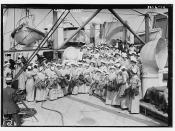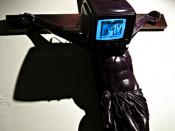The relationship between perception and reality is an intriguing one. Usually it is assumed that perceptions of people are based on the reality of there actions. In other words, how a person is characterized by others stems from the reality of how he chooses to live his lives. It is important to note, however, that in issues of race, this normal relationship between perception and reality is convoluted. Often in cases of race, people may enter into the judgment or the characterization of others with preconceived perceptions that are not always based on the reality of an individual's actions. Furthermore, these perceptions, often misperceptions form the basis of reality. In The Outsider and Uncle Tom's Children, by Richard Wright, the destiny of the characters is based upon how they are perceived by others. In order to understand how perception forms identity, it is important to focus upon central characters in each novel.
In The Outsider, the main character Cross Damon is alienated by society and depends solely upon himself. In Uncle Tom's Children, Big Boy tries to fit the perception of himself and eventually goes too far, leading to a tragic fate. Although it is true in both characters case that perception is derived from reality, each was subject to unfair reputations. Both Cross and Big Boy, shared a similar dilemma in which two misunderstood characters suffered a tragic life.
In The Outsider, Cross is viewed by other, including his friends and family, as an outsider, someone who has no motivation to connect with anyone else and chooses to live life as a loner. Although throughout the novel he is very cool to his family members and friends, it is clear that society has a pre-determined opinion of him. His ex-wife Gladys, girlfriend Dot, and even his own...


